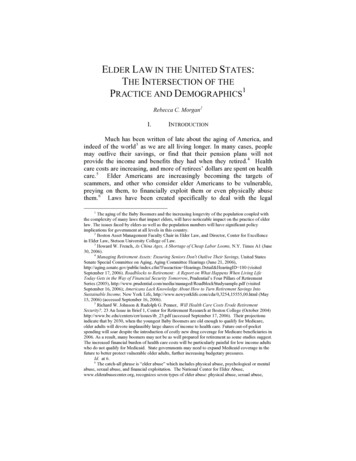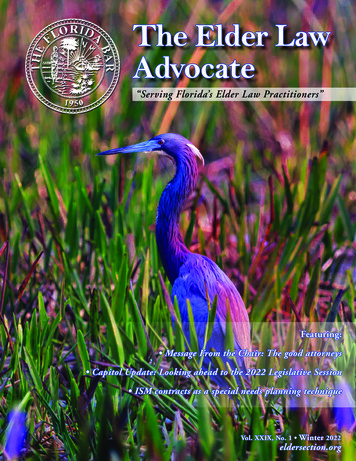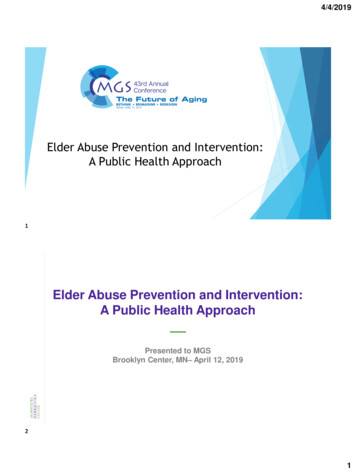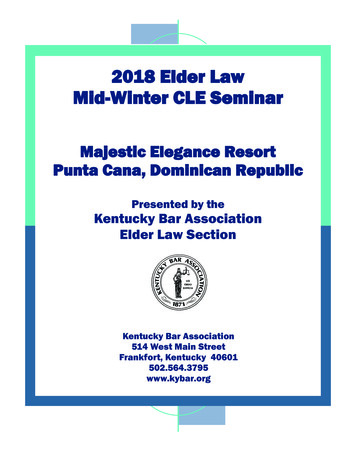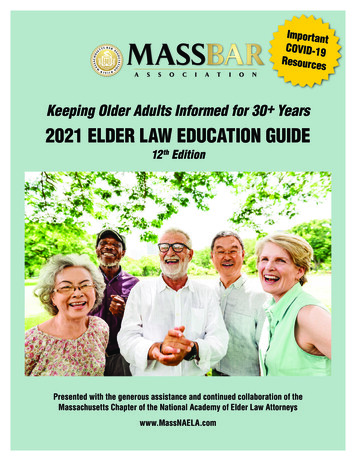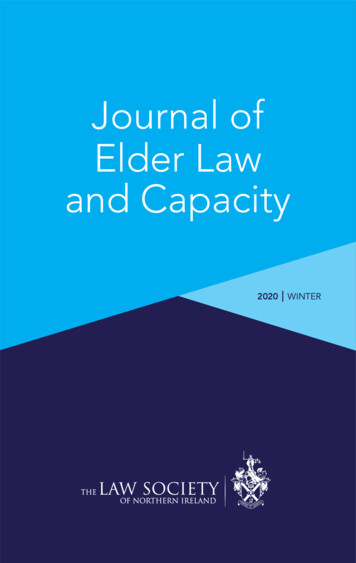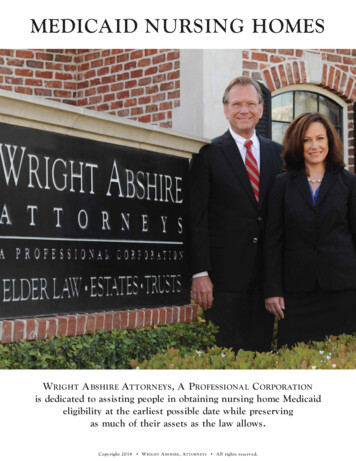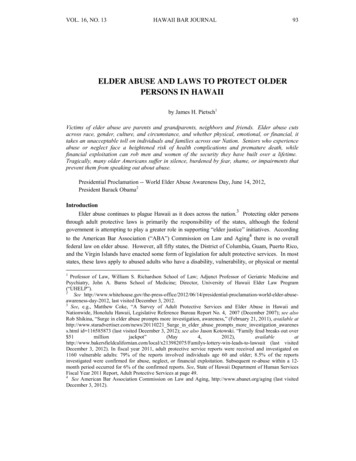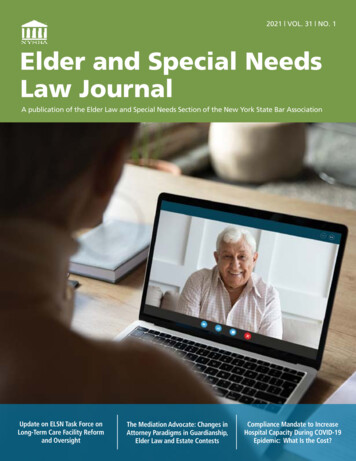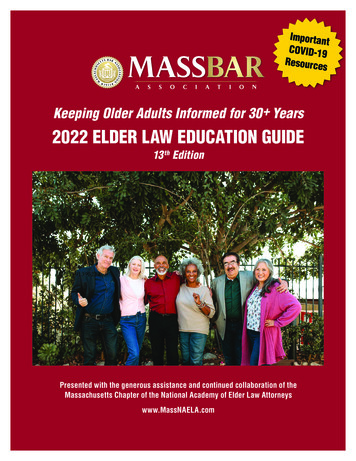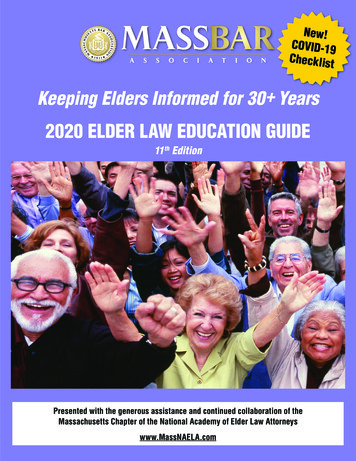
Transcription
New!COVID-19Checklistassaan 1 9 1 1oci at iochuss Barttsse MKeeping Elders Informed for 30 Years2020 ELDER LAW EDUCATION GUIDE11 th EditionPresented with the generous assistance and continued collaboration of theMassachusetts Chapter of the National Academy of Elder Law Attorneyswww.MassNAELA.com
COMMUNITY AND PUBLIC SERVICESJuly 2020Dear Massachusetts Older Adults:This year’s 11th annual edition of the Elder Law Guide (ELG) was completed and ready for publication wellbefore the commonwealth’s “stay-at-home” order was issued. We are now in the new era of the pandemicknown as COVID-19. While our elder law colleagues so enjoy meeting with you at the local Councils onAging (COA) throughout the commonwealth to present this guide, such meetings are not advisable orpractical as this guide goes to print. We are faced with distributing this edition online to the COAs withlimited print copies available for distribution to the public.As you are well aware, COVID-19 has impacted older adults far more severely than others. Therefore, wehave added a COVID-19-specific “Checklist” at the end of this letter, after the acknowledgments, withimportant information and links to COVID-19 updates.The ELG still serves as the comprehensive resource you have used in the past. We hope that we will find waysto meet face-to-face again, in this new normal, as the use of videoconferencing and other forms of virtualcommunication increases. Once the COAs are open and precautions are in place to address COVID-19concerns and safety, we will offer lawyer presentations in this new format of learning.This year’s ELG reflects a significant number of accomplishments in our outreach efforts with keyorganizations, namely:1. To address important aging issues that impact the lesbian, gay, bisexual, transgender and queer(LGBTQ) community, we worked with GLAD, GLBTQ Legal Advocates & Defenders and an experienced elder law attorney who practices in this area;2. To address important elder driving and elder abuse, neglect and financial exploitation issues, weworked with AARP Massachusetts; and3. To address important Medicare issues, we worked with Greater Boston Legal Services’ Elder LawHealth and Disability Unit, Medicare Advocacy Project.Please note, we learned that the terms “elder,” “elderly” and “senior” are no longer in common use. Studiesshow that those of us that are “older adults” really do not like any age-related labels, so bear with us asthe guide uses these terms interchangeably, mindful that “older adults” is now the accepted reference. Wecontinue to evolve with the times to make this guide relevant as we all age together.Finally, volunteers are the heart and soul of the ELG with participation by experienced elder law attorneyswho are members of both the Massachusetts Bar Association (MBA) and the Massachusetts Chapter ofthe National Academy of Elder Law Attorneys (MassNAELA). The time, effort and commitment of theseattorneys are truly remarkable. Many attorneys spent countless hours reviewing and researching these chaptersand are listed below by name after the Advisory Committee members, who spent endless hours reviewingand approving all chapters. The MBA, in partnership with MassNAELA, continues to be a remarkablepartner, committed to helping all older adults face the opportunities and challenges of aging.
The Advisory Committee is especially grateful and appreciative of the support and leadership of ElizabethA. O’Neil, director of community and public services at the MBA, who has kept us all on track, made surewe met all deadlines, and coordinated all the pieces of the puzzle to produce this annual Elder Law Guide.Cordially,Alex L. Moschella, Esq., chairMBA Elder Law Advisory CommitteeADVISORY COMMITTEEAlex L. Moschella, Esq., CELA,* Chair, Senior Counsel, Colucci, Colucci, Marcus & Flavin PC, WoburnJohn J. Ford, Esq., Vice Chair, Northeast Justice Center, LynnJosephine Babiarz, Esq., ArlingtonJudith M. Flynn, Esq., CELA,* Falco & Associates PC, QuincyAnthony H. Gemma, Esq., Gemma Law Office PC, BraintreeEvelyn A. Haralampu, Esq., Burns & Levinson LLP, BostonNatalie A. Simon, Esq., Law Office of Natalie A. Simon, Gloucester* Certified as an Elder Law Attorney (CELA) by the non-profit National Elder Law Foundation, (NELF) (www.nelf.org), the only national organization accredited by the American Bar Association (ABA) to offer certification toattorneys in the specialization of elder law. The Massachusetts Supreme Judicial Court (SJC) does not recognizelegal specialties for certification.
The Massachusetts Bar Association (MBA) expresses its sincere appreciation to the below listed contributing authors, who graciously contributed many hours to review and update the chapters in this guide. TheMBA is grateful to the Massachusetts Chapter of the National Academy of Elder Law Attorneys (MassNAELA) for its participation, generous assistance and continued collaboration on this public service. The MBAwould specifically like to thank Alex L. Moschella, Esq., chair, and John J. Ford, Esq., vice chair, of this 11thedition, for their oversight of this year’s guide and for their dedication to this program since its inception.The MBA also extends a special thank you to Elizabeth A. O’Neil, MBA director of public and communityservices, who provided extraordinary effort and staff leadership to the advisory ING AUTHORSPaula K. Almgren, Esq., Attorney at Law, LenoxRebecca J. Benson, Esq., Special Needs Law Group of Massachusetts PC, FraminghamJ. Patrick Burke, Esq., Attorney at Law, LynnJoseph D. Cataldo, Esq., CPA, Law Office of Joseph D. Cataldo, EverettMichael R. Couture, Esq., Winston Law Group, SomervillePatrick G. Curley, Esq., CELA,* Curley Law Firm LLP, WakefieldJohn W. Donahue, Esq., Wilchin Cosentino & Novins LLP, Wellesley HillsKate E. Downes, Esq., Attorney at Law, Shelburne FallsChris Erchull, Esq., GLBTQ Legal Advocates & Defenders, BostonMichael E. Festa, State Director, AARP Massachusetts, BostonLawrence K. Glick, Esq., Attorney at Law, NeedhamAnnette M. Hines, Esq., Special Needs Law Group of Massachusetts PC, FraminghamJill Sullivan Joyce, HUD Certified Housing and HECM Counselor, NeighborWorks Housing SolutionsMichelle B. LaPointe, Esq., Wade Horowitz LaPointe LLC, BrooklineJoseph A. Latona, CLU, CLTC, CFP, Goldfinch Financial, Manchester, NHTimothy R. Loff, Esq., Law Office of Timothy R. Loff, NewtonDeborah D. Maloy, CFP, Insight Financial Horizons, DanversRuth A. Mattson, Esq., Vacovec, Mayotte & Singer LLP, NewtonDonna McCormick, Esq., Greater Boston Legal Services, BostonNicole McGurin, Director of Family Services, Alzheimer’s Association ofMassachusetts and New Hampshire Chapter, WatertownMark F. Murphy, Esq., Mark Murphy Law Offices LLC, NorwoodPhilip D. Murphy, Esq., CELA,* Philip D. Murphy, Attorney at Law, MiltonStephen R. Pepe, Esq., Reverse Mortgage Funding LLC, MilfordMala M. Rafik, Esq., Rosenfeld & Rafik PC, BostonRichard S. Ravosa, Esq., Ravosa Law Offices, BostonDavid G. Saliba, Esq., Saliba & Saliba, BostonJordan L. Shapiro, Esq., Shapiro & Hender, MaldenLaura Silver Traiger, Esq., Starr Vander Linden PC, WorcesterDaniel M. Surprenant, Esq., CELA,* Surprenant & Beneski PC, New BedfordNeal A. Winston, Esq., CELA,* Winston Law Group, SomervilleLiane Zeitz, Esq., CELA,* Law Office of Liane Zeitz, NorwoodPAGE iii*Certified as an Elder Law Attorney (CELA) by the non-profit National Elder Law Foundation, (NELF) (www.nelf.org), the only national organization accredited by the American Bar Association (ABA) to offer certification toattorneys in the specialization of elder law. The Massachusetts Supreme Judicial Court (SJC) does not recognizelegal specialties for certification.
LEGAL ASSISTANCEMASSACHUSETTS BAR ASSOCIATION PUBLICAND COMMUNITY SERVICESLawyer Referral ServiceOpen Monday through Friday, from 9 a.m. to4:45 p.m., the LRS helps solve legal problems byreferring callers to lawyers or appropriate agencies.Referrals are available 24/7 via www.MassLawHelp.com, the LRS website. The LRS does not offer legaladvice and there is no charge to use the service.Boston area: (617) 654-0400Toll-free:(866) MASS LRS, (866) 627-7577TTY:(617) lp.comDial-A-LawyerCall and speak to an attorney, free of charge, onthe first Wednesday of every month, 5:30 to 7:30p.m.Statewide: (617) 338-0610Toll-free: (877) 686-0711MASSACHUSETTS CHAPTEROF THE NATIONAL ACADEMY OFELDER LAW ATTORNEYS (MassNAELA)The mission of the National Academy of ElderLaw Attorneys is to develop awareness of issues surrounding legal services for the elderly and thosewith special needs. The approximately 500 attorney members of NAELA’s Massachusetts Chapterwork for our elderly population in areas as diverseas: planning for catastrophic care costs; disabilityplanning; age discrimination in employment andhousing; benefits planning, including Medicaid andMedicare; and guard ianships, probate and estateplanning.The objective of both the national and Massachusetts chapters is to promote the highest standards of techni cal expertise while maintaining ethical awareness among attorneys who represent themost frail and vulner able members of society.Contact information:MassNAELAP.O. Box 67137, Chestnut Hill, MA 02467Phone: (617) 566-5640Fax: (617) 734-9758Email: Info@Manaela.orgA copy of this guide can be found and downloaded at www.masslawhelp.com/estate-planning.html.PAGE ivThis guide is being reproduced as a public service of the Massachusetts Bar Association and does not constitute legaladvice. Individuals should always consult with an attorney prior to relying on any information contained herein. Thecontents in this guide pertain only to the laws of Massachusetts at the time of publication. The MBA is grateful to themany attorneys and law students who have given their time and permission to produce the publication.LEGAL ASSISTANCEL EG A L A S SIS TA NC E
JULY 2020This information is provided in the spirit of “prepare for the worst and hope for the best.” The AdvisoryCommittee reviewed information from physicians, health care agencies and others to help you in understanding some possible outcomes and provide instructions to families and care givers as we navigate COVID-19. Again, not everyone will be infected by COVID-19, not everyone will have symptoms, and mostwill recover. However hopeful these facts are, they do not help us prepare for the worst.Physicians have learned that the progression of the disease can be very rapid — just a few days. In Massachusetts, there is a resource that Gov. Charlie Baker has suggested — Buoyhealth.com, that will assist youin determining whether the symptoms you are experiencing are related to COVID-19. Anyone can use thiswebsite. Buoyhealth.com will advise you to follow up with your physician, as well as recommend a healthcare provider if you do not have one, and even track whether or not you followed up. COVID-19 testing isat no cost to you when ordered by a caregiver. You can use telemedicine resources — talking to your doctor by electronic tablet or phone, which Medicare covers as though it were an in-person visit; you pay thedeductible or co-insurance.In addition to advice from your health care providers, should you require hospitalization due to COVID-19, please consider the following specific preparations. COVID-19 may impair your ability to breathe,and if you cannot breathe, you cannot talk, so you MUST write everything down and keep these instructions with you.COVID-19 CHECKLIST AND KEY RESOURCESC O V I D -19 C H E C K L I S T A N D K E Y R E S O U R C E SDOCUMENTS, LISTS AND OTHER ITEMS TO BRING WITH YOU IF YOU ARE TO BE HOSPITALIZED:1.2.3.4.Your health care proxy, living will (if any) and/or other advance medical directives. A sample healthcare proxy is included.A document with your name, age, address and phone number, as well as the names of close relativesor friends and their phone numbers; your Medicare or MassHealth insurance numbers, and anyother health insurance cards.The list of current medications you are on. Be sure to include all heart and blood thinning medications, as well as any chronic illnesses you have.Your cell phone, tablet and/or computer with applicable chargers, because no one will be able to seeyou in the hospital or recovery rooms.COMMUNICATING WITH YOUR HEALTH CARE PROVIDERS, HEALTH CARE AGENT AND FAMILY ANDFRIENDS:1.It is very important to communicate with your health care agent as to what decisions you want themto make on your behalf in the event you cannot make or communicate the decision for yourself.They cannot respect your wishes if you have not made choices for them to follow and told themclearly. You should also consider sharing your medical wishes and directives with your family, friendsand caregivers so that they will be aware of and respect your wishes. There are several resourcesavailable to help you do this — one is the Conversation Project — whose website is theconversationproject.org, which specifically records your wishes. A copy of that form is included at the end ofthis section, along with a sample health care proxy with instructions and a MOLST form, which, ifpresented to you, should be reviewed with your physician.PAGE v
COVID-19 CHECKLIST AND KEY RESOURCES2.Discuss with your health care provider the options for care for COVID-19. Some of the items to askabout may include:a. The use of CPR: CPR is not commonly done in COVID-19 cases. There are safety issues with firstresponders, and issues with poor outcomes for the patient.b. The use of a ventilator: A ventilator is a machine that essentially breathes for you; you are paralyzed andsedated, and the recovery rates can vary between 20% to 60%, depending upon your overall health.c. Do you want to take part in a clinical trial, or consider organ donation for purposes such as research,education or transplant?d. What type of medical care do you want continued — dialysis, cancer treatments, etc. — and what doesyour physician recommend?e. Coronavirus and prevention, plus quick symptom analysis (suggested by Gov. Baker: www.buoyhealth.com.f. Information on mental health (recommended by the Massachusetts Secretary of Health and HumanServices) can be found here: massachusetts.networkofcare.org/mh.g. CDC updates can be found here: www.cdc.gov.h. The Conversation Project on COVID-19, second page form and the Honoring Choices MassachusettsCare Proxy Instruction and Health Care Proxy Document. Both of these forms are also included onpages vii through xii.PAGE viStay updated on COVID-19 news, updates and recommendations from reliable sources: Massachusettsgovernment updates can be found here: ormation.
COVID-19 CHECKLIST AND KEY RESOURCESPAGE vii
PAGE viiiCOVID-19 CHECKLIST AND KEY RESOURCES
COVID-19 CHECKLIST AND KEY RESOURCESPAGE ix
PAGE xCOVID-19 CHECKLIST AND KEY RESOURCES
COVID-19 CHECKLIST AND KEY RESOURCESPAGE xi
PAGE xiiCOVID-19 CHECKLIST AND KEY RESOURCES
CHAPTER 1Important Questions as We Age.1What is Elder Law and What Does an ElderLaw Attorney Do?.1What are the Essential Estate PlanningDocuments and Considerations I ShouldKnow About?.1If I Already Have Some of These Documents,Why Should I Review and Update Them?.1If I Am in a Relationship with My Partner orSignificant Other, and We are Not Married, DoI Have Different Needs?.2What is the Probate Process?.2What Does it Mean to Avoid Probate?.3What if Property is Located Out of State —What is Ancillary Probate?.4What are Federal and State Estate Taxes, andHow Do They Differ From Gift Taxes?.4What is a Deed with a Life Estate? (See Chapter8, Section B).5What is the Difference Between Medicaid andMedicare?.5If I Need Nursing Home Care, But MySpouse Does Not, Will I Still be Eligible forMedicaid? (See Chapter 3).5Who Can See My Medical Information andHow Do I Get It?.5What is a Supplemental Needs Trust?.6What Options Do I Have if I Have To, orWant To, Sell My Home? (See Chapter 8).6What Types of Medical Decisions Will I Have toMake in the Future?.7What is a Guardianship?.8What are the Legal and Financial Decisions IWill Need to Make?.9What is a Conservatorship?.9When Should I Stop Driving?. 11What if I Insure Unmanagable Debt?. 11CHAPTER 2CHAPTER 3MassHealth (Medicaid): What You Need to KnowAbout Medicaid Eligibility and Transfer Rules forLong-Term Care in a Nursing Home.16Introduction. 16Income Limitations. 16Minimum Monthly Maintenance NeedsAllowance (MMMNA) and the PatientPaid Amount. 17Asset Limitation. 17Non-countable Assets. 17Special Rules for the Principal Residence. 18Inaccessible Assets. 18Countable Assets. 19Jointly-held Assets. 19Trusts. 19Community Spouse Resource Allowance(CSRA). 19Permissible Spenddown of Excess Assets.20Transfer Rules.20Deeming Transfers to be Gifts. 21The Spend-down Process. 21Estate Recovery.22MassHealth Application.22Conclusion.22Contact Information. 23CHAPTER 4Community Medicaid (MassHealth) Benefits:Programs for Elders at Risk forInstitutionalization.24Introduction. 24PAGE xiiiVeteran Affairs Financial Benefits: Pension andCompensation for Eligible Veterans and theirSurviving Spouses. 12Introduction. 12VA Pension with Aid and Attendance. 12Financial Limitations. 12Military Requirements. 13Disability Requirement. 14Marriage Requirement. 14Service-connected Compensation. 14Appeals. 14TABLE OF CONTENTSTA BL E OF C ONTENT S
TABLE OF CONTENTSHome- and Community-based Services Waiver. 24Other Programs for Elders. 27Other Important Elder Programs.28Conclusion. 29CHAPTER 5Medicare: What You Need to Know.30Introduction.30What are the Different Parts of Medicare?.30Am I Eligible for Medicare and How Do ISign Up/Enroll?. 32What if I am Turning 65, Still Working and HaveHealth Insurance From My Employer?. 33Medicare Cost Shares/Coverage Limitations. 33Options to Enhance Original MedicareCoverage. 35Changing Medicare Plans. 39Comparing Insurance Providers. 39What Can I do if Medicare Denies a Service/Coverage or Payment?. 39Conclusion.40Chart: Medicare Benefits and Costs forPart A: 2020. 41Chart: Medicare Benefits and Costs forPart B: 2020.42Chart: Calculate Your Part D Premium for2020.43CHAPTER 6PAGE xivLong-Term Care Insurance.44Introduction.44What are the Benefits of Long-Term CareInsurance?.44Potential Tax Advantages. 45When to Purchase Long-Term CareInsurance. 45What to Consider When ComparingPolicies.46LTCI/Life Insurance Policy (Hybrids)Contrasted with Traditional LTCI.46Conclusion. 47CHAPTER 7Long-Term Care: Resident’s Legal Rights .48What is Nursing Home Care?. 48What is Assisting Living?.48What is a Continuing Care RetirementCommunity?.48Choosing a Nursing Home.48Dementia Care Standard for Nursing Homes. 49Nursing Home Resident Rights. 49Nursing Home Transfers and Discharges inMedicaid and Mediare Certified Facilities. 50Department of Public Health Regulations. 51Medicaid Regulations. 52Attorney General’s Regulations. 52Consumer Resources for Nursing HomeResidents. 52Long-term Care Ombudsman Program.54Assisted Living Regulations.54Assisted Living Resident Rights.54Assisted Living Ombudsman Program.54Consumer Resources for Assisted LivingResidents. 55Continuing Care Retirement CommunityOversight. 55Executive Office of Elder Affairs Assisted LivingCertification Form.56-57CHAPTER 8Homestead, Life Estate and Tax Exemptions.58Introduction. 58Homestead Declaration. 58Deed with a Life Estate. 58How Exemptions and Deferrals Work. 59Exemptions.60Deferring Taxes. 62Other Tax Exemptions and Creditsfor Seniors. 63Additional Resources and Conclusion.64CHAPTER 9Reverse Mortgages: Basic Information About aPotentially Helpful Retirement Tool.65Introduction. 65What is a Reverse Mortgage?. 65
What You Need to Know About Social Security.77Introduction.77Retirement Timing.77Factors Affecting the Calculations. 78Taxes and Other Factors to Consider. 78How Working Affects Your Benefits. 78Family Benefits. 79Coordinating Social Security with PrivateRetirement Benefits.80Social Security Benefits andGovernment Pensions.80C H A P T E R 10C H A P T E R 13Elder Abuse, Neglect and FinancialExploitation.71Introduction. 71What is Elder Abuse?. 71What Should I Know About FinancialExploitation of Elders?. 71I am Worried About an Elder Who Cannot Carefor Himself or Herself. 72What Should I Know About Abuse in a NursingHome?. 72Who Can Report Elder Physical or EmotionalAbuse, Neglect or Financial Exploitation?. 72Is There a Statewide Agency That Helps ElderlyVictims?. 72What Happens When Abuse is Reported?. 73Will an Elder Lose His or Her Rights OnceProtective Services are Involved?. 73What Protections are Available to LGBTQElders?. 73Elder Driving.82Introduction. 82The Aging Process. 82Mass. Registry of Motor Vehicles. 83Resources. 83C H A P T E R 11Special Considerations for Disabled DependentAdult Children.74Introduction. 74Government Benefits: SSI, SSDI andMassHealth Benefits. 74Special Needs Trusts. 75C H A P T E R 12TABLE OF CONTENTSHow Does a Reverse Mortgage Compare with theOther Mortgages?. 65Types of Reverse Mortgages. 65How Does a HECM Reverse MortgageWork?.66Chart: Loan Comparison.66Repaying a HECM Reverse Mortgage.68Reasons to Use a HECM Reverse Mortgage.68Determining Eligibility for a HECM ReverseMortgage. 69Fees Associated with Obtaining a ReverseMortgage. 69Reverse Mortgage Counseling. 70C H A P T E R 14Overview of Common Bankruptcy and DebtIssues for the Elderly and Retired.84Introduction.84What is Bankruptcy?.84Some General Considerations.84How Chapter 7 “Liquidation” BankruptcyWorks.86How Chapter 13 “Reorganization” BankruptcyWorks.86Alternatives to Bankruptcy. 88Conclusion.90C H A P T E R 15Resource Directory.91ENDNOTESAll Chapters.93PAGE xv
IMPORTANT QUESTIONS AS WE AGEThe following questions and answers addressthe basics of elder law. Some of these issues are explained at greater length in later chapters. If such achapter is contained in this guide, it is referenced sothat you may find it. These questions, experience hasproven, are the most common questions raised byparticipants throughout the state in the annual LawDay program during the month of May conductedby the Massachusetts Bar Association (MBA) andMassNAELA volunteer attorneys.A. What is Elder Law and What Does an ElderLaw Attorney Do?Elder law is life care legal planning that ensuresthe needs of an individual are addressed from amulti-disciplinary perspective. Elder law includesthe following range of services: Asset protection planning; Basic Social Security retirement planning; Medicare, Medicaid (MassHealth) and otherpublic benefits planning; Interplay of long-term care and financial planning; Use of long-term care insurance; Health care decision-making and the use ofadvanced directives; Estate planning and the use of durable powersof attorney, living trusts, wills and real estatestrategies to protect the family home; and Housing options and alternatives to nursinghomes.An elder law attorney should be able to addressall of the issues/matters listed above. See the ResourceDirectory in Chapter 15 to find an experienced elderlaw attorney.B. What are the Essential Estate PlanningDocuments and Considerations I ShouldKnow About?IMPORTANT QUESTIONS AS WE AGECHAPTER 1 Wills (see Chapter 1, Section E)Health care proxies (see Chapter 1, Section O)Power of attorney (see Chapter 1, Section Q)Deeds with life estates and realty trusts (seeChapter 8, Section B) Revocable and irrevocable trusts (see Chapter3, Section I) Gifting plans and related concerns (see Chapter 3, Sections L and M) Asset protection plans (see Chapter 3, SectionsC, D, G, J and N)C. If I Already Have Some of TheseDocuments, Why Should I Review andUpdate Them?PAGE 1An estate plan evolves over time, and it iscritical to continuously review that plan for thefollowing reasons. First, it is important that yourdocuments remain current with changes in the laws.Massachusetts implemented significant changes to itsprobate code in 2012, now called the MassachusettsUniform Probate Code (MUPC) (laws that affectdeath and incapacity). These overhauls in the lawcan have drastic and unintended consequences forplans executed prior to these changes. Goals maychange as you progress to different stages of
perienced elder law attorney who practices in this area; 2. To address important elder driving and elder abuse, neglect and financial exploitation issues, we worked with AARP Massachusetts; and 3. To address important Medicare issues, we worked with Greater Boston Legal Services' Elder Law Health and Disability Unit, Medicare Advocacy Project.
